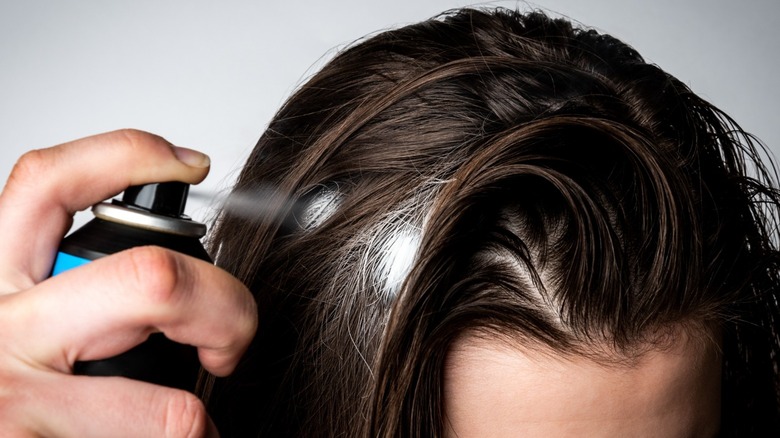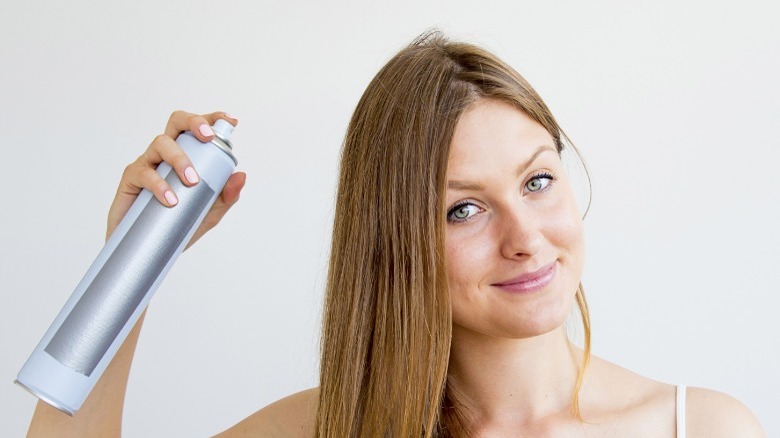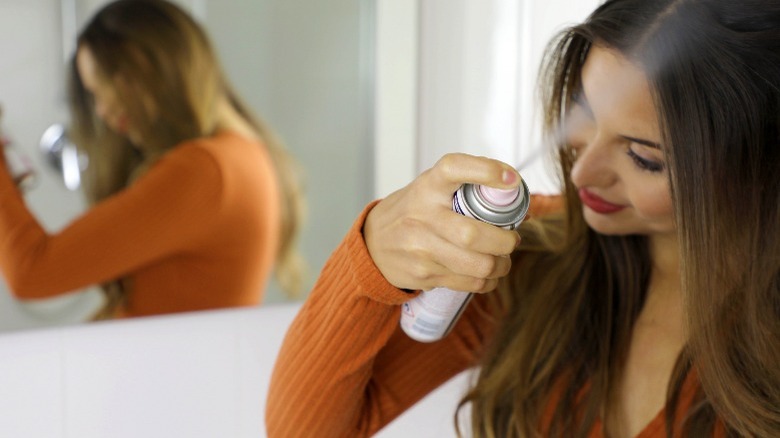How Does Dry Shampoo Actually Work?
You have probably experienced a day where you've felt too lazy to wash your hair or simply didn't have the time to, so you reached for the dry shampoo hanging out underneath your bathroom sink. This seemingly miraculous spray-in product, which has been on the market since the 1940s, is time-saving, convenient, and claims to have the same benefits for your locks and scalp as traditional shampoo does, according to Reader's Digest.
Dry shampoo, which is generally alcohol, clay, or starch-based, works by absorbing the oil and grease on your hair in between proper washes, according to the Cleveland Clinic. However, is this dry powder actually a suitable (and more importantly, healthy) alternative to lathering our locks with liquid shampoo? According to dermatologists, there's a time and place for dry shampoo in one's routine. However, as far as replacing washes and rinses permanently with dry shampoo goes, it's not the most ideal practice, especially if you're trying to maintain healthy hair.
What are the limitations of dry shampoo?
There are a number of limitations to dry shampoo, the biggest being that it doesn't clean your hair as thoroughly as traditional, or "wet" shampoo does. Wet shampoo also promotes a healthy scalp by removing product buildup, dead skin cells, and dandruff. "Your hair and scalp needs to be washed and rinsed intermittently to keep it clean," dermatologist Wilma Bergfeld told the Cleveland Clinic. "The scalp collects chemicals and pollutants both from the air and from cosmetic care products, and if you only use a dry shampoo, the cleansing is only minimal but it does freshen the hair by removing oils."
Another limitation is that if you continue to use dry shampoo with no washes in-between, the product eventually builds up on your scalp, making it counterproductive toward the initial goal of cleansing your hair. At the most, the Cleveland Clinic suggests you can use a dry shampoo product sparsely for up to three months. "Sparsely" is the key word here, as using dry shampoo two or more days in a row can result in irritation or dryness, per Healthline. Though there are mixed opinions on this, some people also say that you should avoid using heat styling tools after applying dry shampoo as it might further dry your hair out, resulting in damage.
Here are the benefits of dry shampoo
Of course, there are also some obvious benefits to using dry shampoo once in a while. For starters, dry shampoo is versatile in that it works on all hair types (in contrast to traditional shampoos, which often tailor to a specific hair texture). Cosmetically speaking, the product is also a great way to add temporary volume to your locks, helping you to finally achieve that big hairdo you've always dreamt of rocking!
Additionally, if you're into getting your hair washed and blow-dried at the salon, dry shampoo can actually help you extend the life of your blow-outs (which can save you some money in the long run). Lastly, if you have colored hair, some dry shampoos (which are specifically formulated for colored locks) can be a great way to preserve your color for longer, as every time you wash your hair with wet shampoo, your color fades and you may lose a bit of luster and shine, as per Bustle.
As always, you will want to do your research before committing to any hair product permanently.


